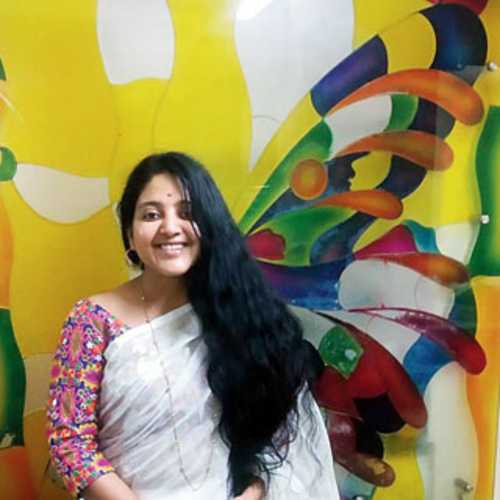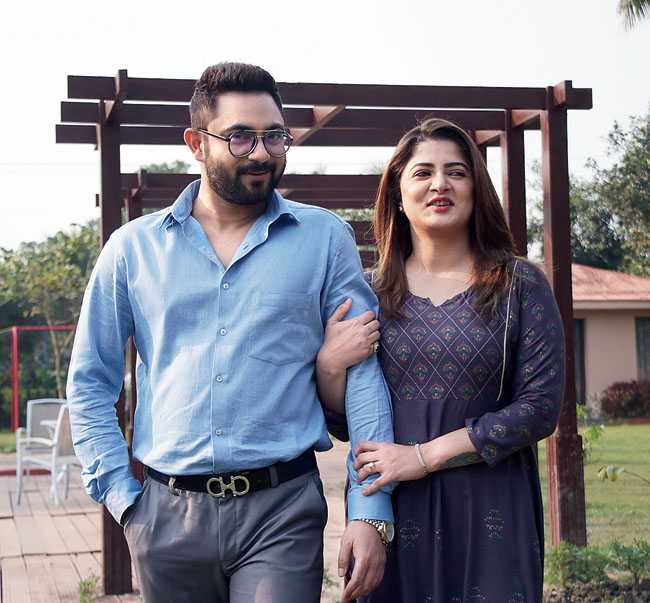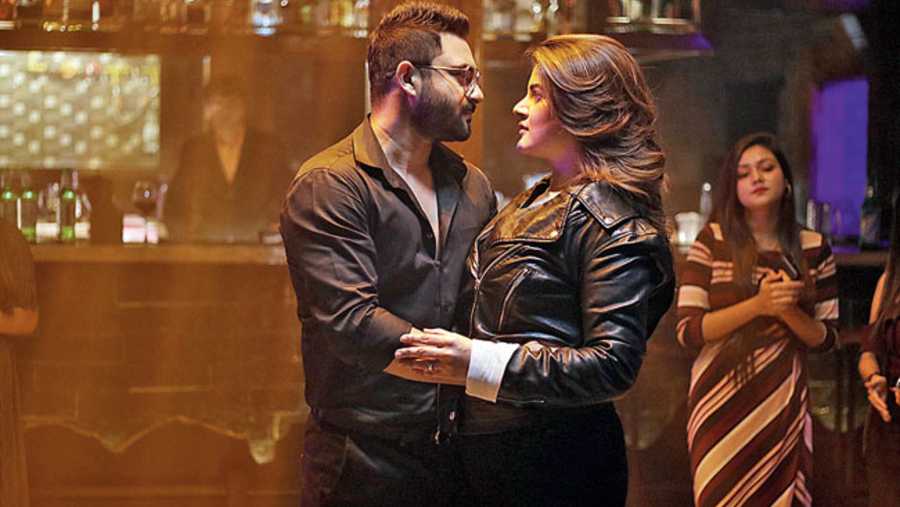Ahana (Srabanti) and Amar (Soham) have been happily married for five years. But things take a sudden turn when Amar meets with an accident. It changes him in ways Ahana can’t explain. When she spots him at the most unusual of places, her intuition turns into suspicion. Has Amar changed due to his traumatic accident or is something sinister brewing under the surface? The Hoichoi web series Dujone raises questions and explores issues of trust, faith, deception and the strength of a relationship. A candid chat with director Promita Bhattacharya...

Promita Bhattacharya Sourced by the correspondent
What kind of feedback are you getting now for Dujone?
It is looking good. I got feedback from people who swear by Soham-Srabanti films and from people who swear by OTT platforms.
What’s been your fave compliment?
My school friend sent me a photo of his mother and him watching Dujone — the first web series he has watched with his mother, and both enjoyed it.
What was your brief to Soham and Srabanti?
Let’s attempt a delicious balance of the very popular, familiar Soham-Srabanti and a refreshing new avatar of Soham-Srabanti.
Did you hold any workshops?
All I could manage was to write and send them detailed character notes. On the day of shoot both Soham and Srabanti behaved like they know me from my notes! We did all the chatting and exploring of characters together, on the go. It always felt like we’re on the same page!
How was your experience directing Soham and Srabanti?
I was obliged by the dedication and diligence of the two superstars even as they worked with a debutant director.
You studied film-making in FTII. Tell us a bit about your background.
This one’s all over the place... I did my Major in English Literature from St. Xavier’s College, Mumbai, did my post graduation from the FTII, with Majors in Direction and Screenplay. I was an observer with Hitendra Ghosh while he did the sound design of Mangal Pandey — The Rising. I subtitled Prakash Jha’s film Apaharan and worked on its PR. Then I joined Rakeysh Omprakash Mehra as his DA, while he was doing Rang De Basanti and continued with him through a lot of ad films and Delhi-6. In 2009 life choices took me to Delhi, where I was the Chief AD and Acting Coach in Nila Madhab Panda’s first film I Am Kalam. I shifted to Calcutta in 2010 and took a sabbatical from films for personal reasons. I had to earn a living. Writing TV serials was my saviour. I pitched Subarnalata to Zee Bangla and wrote the screenplay for the first month. Ganer Oparey dialogues was my next assignment and had to match the super high standards set by Rituparno Ghosh and Anujadi (Burman). Then there was Tumi Ashbe Bole and so many more. Mostly Bengali, a few Hindi. In 2018 I realised I can’t get old and die before I’ve directed my own films. The pursuit has been on, while writing treatment notes for ad films has sustained me lately. Then Dujone came as a pleasant surprise. I’ll be ever so thankful to SVF.
There are two strands to the story. The thriller with the terrorist group angle and the relationship part. It works because of the strong relationship tale, and the way the issues of trust, secrets, deceit, lies come into play. It also plays on our fear of losing the person we love. It turns into a cat-and-mouse chase with the wife investigating the husband. How did you decide on the structure of the story? What did you want to focus on?
Of course the focus was on the little emotions that come to play between Ahana and Amar and how these hold the key to the thriller. I’d credit this decision to Mitalidi (Ojha) and Romit (Ojha). The story is their brainchild. I hope I have done justice.
The small cues that Ahana picks up lead to meaningful revelations.... for example the Egiye de song which Amar had said he would remember forever. Or the bit about cufflinks. Or smoking. How important was weaving these into the script?
That was the key... how emotions become the ingredients of a thriller. The pacing and punctuation is aimed at keeping the audience vulnerable yet at the edge of the seat.
The superhit Egiye de song also works brilliantly as a Srabanti homage as well! How did you arrive at the idea?
From Day One our understanding was very clear: Dujone is about Soham-Srabanti magic explored afresh, with a new twist. What would recreate that magic better than the iconic songs of Soham and Srabanti? Oh my love too brought back nostalgia. Even the Oh my love music video received huge love.

Soham and Srabanti in the Hoichoi web series Dujone
How did it feel like shooting the sequence?
We were recreating an iconic song and we entered the pub, badly pressed for time. Then we got to know we won’t be permitted to shoot with real alcohol or sealed bottles as we are shooting during non-pub hours! And my scene started with a game involving beer bottles! How will the scene ever happen? But it all worked like magic — the light, the camera, the costumes, the beer bottle trick shots and above all the magic on-screen chemistry of Soham-Srabanti! Smooth as red velvet cake!
In the sixth episode, there is a dissolve (“a gradual transition from one image to another, with the first image beginning to disappear as the second image gradually appears”), which happens when Ahana tells Rajdeep’s character she won’t be able to sleep in her house again. We noticed the dissolve after a long time in a new Bengali web series. It was a regular feature in classic Hollywood films. Why the dissolve there? Also another one just before this scene, with a close-up of Amar’s face to a shot of masks on a wall.
Because it felt like long dissolves those two times! That’s how, that’s where all the film (and web series) grammar are born, I believe. The dissolve at Rajdeep’s house felt right as Ahana almost passed out under pressure but then again rose up and held herself together. The masks have been there on a wall in Amar’s room, playing on our subconscious, like the various reflection shots also do. And suddenly in the ‘Soham’s- face-to-masks’ dissolve scene, that two-faced-ness is right on your face, scaring not just Ahana but us.
In the climax, Dujone makes use of a formula by employing the doppelganger idea. They look the same, have the same height, beard, voice tone, they even speak similarly. In the age of masks based on a 3D scan of faces, surgeries, voice changing software, why go for a formula idea that used to happen in old Hindi movies? The dark web is used in Dujone. Then why this judwa concept, which is archaic?
In the age of 3D face-mapped masks, high tech voice modulators and despite clever references of dark web and phone tracking, there is no denying that we do immensely enjoy the archaic film tropes time and again. Ask Rohit Shetty, David Dhawan! We love them! In my opinion, when we want to do that, we must do it with elan... revisit, re-explore, celebrate it in style! We enjoyed it. I’d love to believe the huge Soham-Srabanti fan base enjoyed it!
The cinematography is quite innovative, with scenes using light from a mobile phone to light up a dark room. How did this idea come about? How did you and the DoP collaborate?
This was the first time I worked with Souvik Basu. He soon became Chintu, felt like my twin! Every day we’d travel together discussing what exactly needs to be conveyed in each scene. In all the rush, he’d be my Santa Claus, asking me, “Tor ki chai just bol!” I felt so much at ease, so empowered! One casual chat went like, “In real life the insides of cars aren’t lit from below, like we see in films.” “So we don’t light the insides of cars artificially,” was Chintu’s answer. And we dared to decide, we’ll use available light as much as possible.











